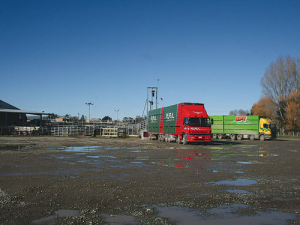Editorial: Happy days
OPINION: The year has started positively for New Zealand dairy farmers and things are likely to get better.
 Taranaki Regional Council will reach out to transport, rail, agricultural machinery, nurseries, forestry and roading contractors.
Taranaki Regional Council will reach out to transport, rail, agricultural machinery, nurseries, forestry and roading contractors.
Taranaki Regional Council and the Ministry for Primary Industries (MPI) have joined forces to identify the pathways by which new pest plants could enter the region, whether by road, rail, coast or air.
The Council will then work alongside the sectors most at risk of inadvertently transporting pests in and out of Taranaki.
The project, currently in its early stages, also aims to raise public awareness and encourage locals to be vigilant.
Environment services manager Steve Ellis says strong biosecurity is of fundamental importance to Taranaki’s environment, economy and health.
Not only do pest plants and animals threaten native ecosystems, they are a risk to agriculture and production. Aquatic pest plants such as hornwort can also interfere with the recreational use of lakes and other waterways.
Ellis says pest control is an ongoing challenge and the last thing Taranaki needs is a new biosecurity threat to contend with.
“We will soon start reaching out to port users, iwi, community groups and higher risk industry groups such as transport, rail, agricultural machinery, nurseries, forestry and roading contractors,” he says.
Ellis says these groups often travel into the region from other regions who may be battling pest species not yet present in Taranaki.
“Pests can be imported as seeds in dirty machinery, in soil, as eggs on contaminated goods or as live pests just hiding out in freighted goods.”
“We’ll be offering any support they need, and just ensuring biosecurity remains front of mind as they go about their business.”
The Council works closely with neighbouring regional councils on biosecurity issues.
Ellis says if a new pest does make its way into the region, the important thing is to identify it quickly and stamp it out before it has the chance to spread.
“We need lots of eyes so will be asking the public to keep their eyes out and use the free Find-a-Pest app to identify anything suspicious.”
The Council is on alert for a number of new pest plants including alligator weed, which has taken hold in both the Waikato and Horizons regions.
“It’s right there at our borders and we desperately want to keep it out. It clogs up waterways and is causing major headaches and cost for those regions,” Ellis says.
Other threats include the coastal plant sea spurge, a significant environmental and public health concern. It is not known to have established in Taranaki but is edging closer from both the north and south. Plague skinks are common stowaways with population pockets in Taranaki, while Chilean needle grass and Darwin ants would be problematic should they turn up.
The World Wide Sires National All Day Breeds Best Youth Camp Best All Rounder plaudit has become family affair, with 2026 Paramount Cup winner Holly Williams following in her sister Zara's footsteps.
DairyNZ is giving New Zealand farmers a unique opportunity to gain hands-on governance and leadership experience within the dairy sector.
Herd improvement company LIC has posted a 5.2% lift in half-year revenue, thanks to increasing demand for genetics.
According to the latest Fresh Produce Trend Report from United Fresh, 2026 will be a year where fruit and vegetables are shaped by cost pressures, rapid digital adoption, and a renewed focus on wellbeing at home.
The Roar is a highlight of the game hunting calendar in New Zealand, with thousands of hunters set to head for the hills to hunt male stags during March and April.
OPINION: The past few weeks have been tough on farms across the North Island: floods and storms have caused damage and disruption to families and businesses.